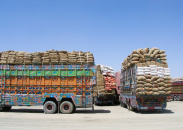‘One Network’ catches the eye at IDEAS-22
Project aims at fulfilling telecommunication requirement of country

Participating of the International Defence Exhibition and Seminar 2022 (IDEADS-22) evinced keen interest in the ‘One Network’ project of the Frontier Works Organization (FWO) the on the second day of the mega event at the Expo Centre in Karachi on Wednesday.
The ‘One Network’ is an advanced communication project, under which 3,000 kilometres of underground fibre optic cable is being laid along the motorways across Pakistan. After the completion of the project, it would meet Pakistan's telecommunication requirements.
According to the One Network chief operating officer (COO), 2,000 kilometres of fibre optic cable haf been laid under the motorways communication infrastructure. People traveling on the motorways would get relief from the rush situations. It would also eliminate cash payments at toll plazas.
The system would also be linked to the motorway police to keep check on any violation of the traffic rules, such as wearing of seat belt and the speed limit. Besides, in case of emergency, people would get timely recovery or rescue assistance.
The ‘One Network’ covers M1 to M16 Motorways in Islamabad, Peshawar, Lahore, Pindi Bhattian, Multan, Sukkur, Karachi, Hyderabad, Sialkot, Dera Ismail Khan, Swat and Hazara, besides the Lahore Ring Road and Lahore-Faisalabad route.
The FWO is also conducting six diploma courses. According to the principal of this project, Col (retd) Atif, about 45 short courses of three to six months of duration were also offered. The graduated from here were associated with technical fields in Pakistan and other countries.
Meanwhile, during a seminar titled ‘Artificial Intelligence (AI) in Defence Market: A Paradigm Shift in Military Strategy and National Security’ as part of IDEAS-22, artificial intelligence (AI) experts underscored the essential role of universities to keep Pakistan abreast with advancements in this field.
The seminar was orgnaised by the Institute of Policy Studies (IPS), Islamabad, and the Defence Export Promotion Organization (DEPO), where Minister for Defence Production Israr Tareen was the chief guest, said a press release issued here.
Addressing the seminar, Tareen acknowledged the country’s progress in the industrial and defence sectors, driven by the AI and machine learning (ML). He also underscored the role of academia, research scholars, and data-savvy individuals in the development process.
“Pakistan can become a global hub for AI, data science, cloud-native computing, edge computing, block-chain, augmented reality, and the IoT by reshaping and revolutionising education, businesses, and research through adoption of cutting-edge technologies and the AI-driven applications,” he said.
He emphasised that the country’s talented youth should be provided opportunities in the field of the AI and the Fourth Industrial Revolution [Industry 4.0] through initiatives like the Presidential Initiative for Artificial Intelligence and Computing (PIAIC).
“Apart from social, political, and economic changes, advanced technologies, 5G, and the AI have also changed the whole dynamics of contemporary warfare, battlefields, tactics, and strategies, the minister told the participants.
“With such strategic shifts, the concept of security has widened beyond conventional terms and rudimentary procedures to include sophisticated mechanisms and technology-driven procedures. These pose new challenges to the states,” he said.
IPS Chairman Khalid Rahman, who delivered the introductory remarks, highlighted the role of human intellect and research in the process of development. “In this regard, universities have served as the key platforms to set the pace for humanity in the key areas,” he said.
“The progress in AI will not stop and no country should stay behind in the AI development,” he emphasised. The role in AI progress is essentially played by universities, where research, creativity, and collaboration … can not only capitalise on the potentials of AI but also deal with the challenges.”
To meet the new complex security challenges of the 21st century, the other speakers presented their research papers, ideas, and findings on different AI-driven applications and processes, upon which the future international security dynamics depend.
Lt-Colonel Dr Ghulam Murtaza, Dr Yasar Ayaz, Dr Muhammad Tayab Ali, Maj Aon Safdar, Dr Waleed Bin Shahid, Lt-Col Usman Zia and Sqn-Ldr Javeria Farooq also addressed the seminar. The session was followed by a discussion by the panel.



















COMMENTS
Comments are moderated and generally will be posted if they are on-topic and not abusive.
For more information, please see our Comments FAQ